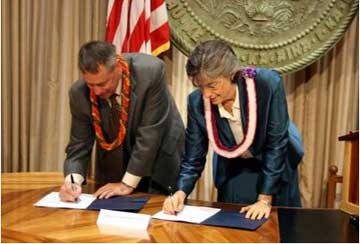
During a ceremony at the state capitol in Honolulu, NASA's Ames Research Center Director S. Pete Worden and Hawaii Governor Linda Lingle signed a three-year non-reimbursable Space Act Agreement establishing a partnership for space exploration, scientific research and education initiatives in science, technology, engineering and mathematics, known as STEM.
"NASA and Hawaii have collaborated in space exploration since the early years of our space program when Apollo astronauts trained for their missions on the lunar-like volcanic terrain on the Big Island of Hawaii," said Worden. "With this agreement, we look forward to extending that partnership even further as we continue to explore and expand into space."

Unique Partnership with NASA Ames Research Center Announced Governor Linda Lingle and NASA's Ames Research Center Director S. Pete Worden signed a three-year Space Act Agreement establishing a partnership for space exploration, scientific research and education initiatives in science, technology, engineering and mathematics, known as STEM, including robotics initiatives.
"The inauguration of a new Space Act Agreement with NASA is an innovative partnership that will leverage Hawaii's unique location, strategic technological assets and capabilities, and international ties throughout the Asia-Pacific region to advance space exploration, next-generation aviation, scientific research and STEM education," said Lingle.
"This alliance represents a truly exceptional and timely opportunity for our state that will help diversify our economy by developing the local aerospace industry, as well as expand Hawaii's leadership role in the global space enterprise," Lingle added. "We look forward to continuing to collaborate with NASA in realizing the substantial scientific, educational and commercial development opportunities this agreement will afford both our state and our nation."
"For nearly 50 years, Hawaii has been at the forefront of pioneering programs in astronomy, planetary geosciences, broadband satellite communications, space-based environmental monitoring, and deep-space surveillance," said Lt. Governor James R. "Duke" Aiona, Jr., who represents Hawaii as a vice chairman of the national Aerospace States Association. "This new agreement builds upon a dynamic partnership with NASA that over the next three years will substantially increase Hawaii's competitive advantages and help to enhance our long-term economic prosperity."
NASA maintains a satellite tracking station on the island of Kauai and has a long history of conducting deep space observations from the advanced telescopes on the Hawaiian Islands. It also supports a broad range of educational programs through the Hawaii Space Grant Consortium at the University of Hawaii. NASA's Space Grant national network of 52 consortia in all 50 states, the District of Columbia and the Commonwealth of Puerto Rico includes more than 850 affiliates from universities, colleges, industry, museums, science centers, and state and local agencies supporting and enhancing science and engineering education, research and public outreach efforts for NASA's aeronautics and space projects.

Students and professors from the university will be sent to Ames to work with scientists and engineers to design, integrate and manage small satellites. During their training, the visiting students and professors also will work with other small satellite contractors in NASA Research Park, such as Santa Clara University.
The overall goal of the collaboration is to develop a Hawaii-based program for small spacecraft missions and a satellite project developed and managed by students. NASA will benefit from the insights provided by the students and their professors toward future NASA missions. HawaiiSat also will enable NASA to help develop the next generation of explorers, engineers and scientists needed for future space exploration. The Space Act Agreement also provides for the addition of future annexes for NASA and Hawaii to collaborate.

